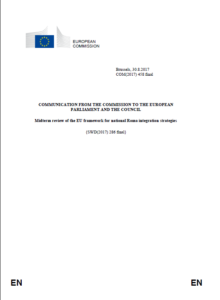 The Commission has published a Midterm review (COM(2017) 458) of the EU Framework for National Roma Integration Strategies, assessing progress made and challenges ahead in its implementation
The Commission has published a Midterm review (COM(2017) 458) of the EU Framework for National Roma Integration Strategies, assessing progress made and challenges ahead in its implementation
The Communication confirms the added value of the (EU) framework, the relevance of the EU Roma integration goals as well as the continued need for a combination of targeted and mainstream approaches and it highlights some of the most important improvements prompted by the EU Framework such as the commitment to address Roma integration, the creation of structures for cooperation and coordination or de adoption of national strategies. It nevertheless stresses the limited impact all this has had in bringing about a real change in the situation of Roma.
While progress is mainly visible in the area of education (particularly the growing participation in early childhood education and care points), the rates of early school-leaving and poverty risk among Roma remain alarmingly high and so do the growing proportion of Roma “NEETS” –not in education, employment or training-.
The EC urges to increase efforts to improve access of Roma to schooling and employment.
The Communication refers to the mobilisation and alignment of legal, policy and funding instruments as one of the most important improvements prompted by the EU Framework and in particular to how the 2014-2020 European Structural and Investment Funds (ESIFs) have included several innovations to link policy priorities with European funding. However, and despite the increasing number of Member States investing in measures promoting actions to improve the situation of Roma (mainly by using ESIFs), the EC calls on Member States to:
- Ensure sustainable national funding of integration measures
- Develop, measure and report the impact of integration measures on Roma school attainment, employment levels, desegregation, access to health, housing and quality services and,
- Use 2014-2020 funds to upscale, extend and multiply smaller-scale initiatives that proved successful in 2007-2013
The Communication also mentions how the NRCPs have become increasingly involved in the coordination of Roma-related policies and have contributed to policy-making and the use of national and EU funds. And it points out that strengthening their human and financial resources would allow them to perform their tasks more effectively.
In conclusion, the Communication highlights the following priorities for strengthening the implementation of the EU framework:
Horizontal areas:
-Reinforce and distinguish the anti-discrimination and antigypsyism focus both under the EU Framework and NRIS;
-Promote Roma participation and empower Roma children, youth and women
Structural areas:
-Reinforce partnership and support more inclusive coordination structures
-Consolidate a transparent system of reporting and monitoring to feed policy learning
-Support independent civil society
Key policy areas and the use of policy, legal and funding instruments
-Focus on a limited number of key areas to be addressed by the coordinated use of policy, legal and funding tools for visible results
-Ensure more effective use of and better access to EU funds
The EC has also launched an open in-depth evaluation of the effectiveness, efficiency, coherence, relevance and added value of the EU Framework for NRIS, covering all key elements of the European and national approaches to Roma integration, including the policy, legal and funding instruments that have been aligned and mobilised since the 2011 launch of the EU framework. The evaluation will further explore ways to develop the EU framework and feed into the planning for targeted and mainstream EU policy, legal and funding instruments post-2020. The public consultation is open until 25 October 2017.
For more information:
- COM(2017) 458 final | Midterm review of the EU Framework for national Roma integration
- European Commission press release
- Council’s call for a post‑2020 European strategic approach to Roma inclusion
- Other information on Roma in the EU

